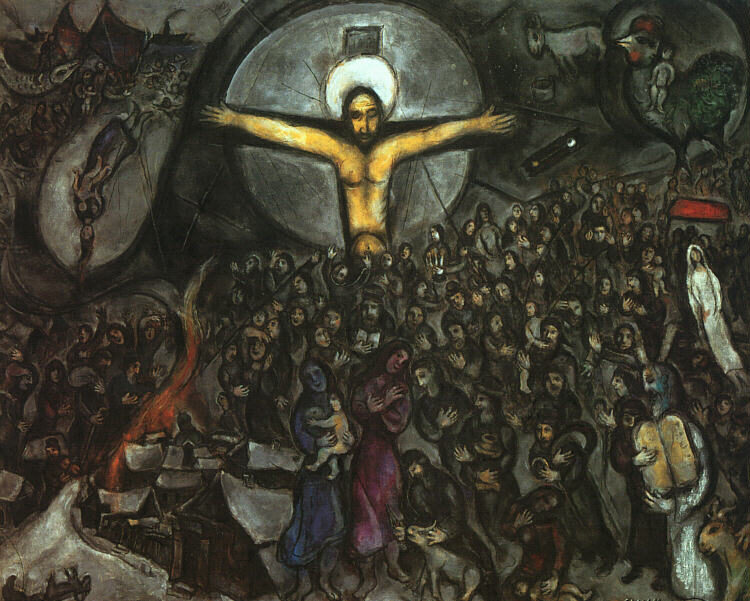What does the New Testament mean by its use of the term “the Jews”? Does it mean every Jewish person who ever lived? Or perhaps those in Jerusalem at the time. Or maybe those who did not believe that Jesus is the Messiah.
In this parsed essay we will explore this question in these parts:
Part 1: Introduction and The Blood Libel
Part 2: Crucifixion Was Roman and Not Jewish and Who is Responsible for Jesus’ Death? Part 3: FalsityPart 4: Conclusion
Jesus was Jewish, the twelve Apostles were Jewish, the fist disciples were Jewish. What later came to be known as the Christian movement was founded by a Jew, joined by Jews, and spread by Jews with Gentiles—non-Jews—eventually joining this movement (followers of Jesus were originally known as followers of the Way).
The New Testament comprises twenty-seven books—twenty-five were written by Jews and two were written by the Greek doctor Luke (see my essay A Jewish Book Called the New Testament). In the New Testament we find that it is the Jewish writers and speakers who use the term “the Jews.” Some may think that they did this in order to besmirch. Others may think that they did so because they were now Jewish-Christians and were distancing themselves from the non-Christian Jews.
Putting all speculations aside; we find that contextually the Jewish writer / speakers were generally referring to the Jewish religious leaders when they utilized the term “the Jews.” One such description of whom they addressed as such is found in Luke 24:19-20,
“…Jesus of Nazareth, who was a man, a prophet mighty in deed and word before God and all the people, and how the chief priests and our rulers delivered Him to the judgment of death, and have crucified Him.”
Jesus speaks very differently to the common people as opposed to the religious rulers.
In the eyes of the Jewish religious leadership putting Jesus to death was the correct course of action. Since they thought Him to be a false prophet (or false Messiah) the Law of Moses, the Torah, called for such retribution. In that sense we may state that they thought that they were doing the right thing. Of course, they were not doing the right thing since Jesus is the Messiah. The point is that when we understand the point of view of some of the religious leaders of the time we should not be surprised to learn that they wanted to put Jesus to death. As far as they could see, it was their religious duty (of course, there were various other motivating factors).
The Blood Libel:
When, while calling for Jesus’ crucifixion, the crowd stated, “Let His blood be on us and on our children,” (Matthew 27:25) they were utilizing hyperbolic language in order to accentuate their total assurance that they were acting correctly, as they saw it and according to their Law; they were calling for the death of a false prophet. Another aspect to consider is that the Jewish people know that God deals with them nationally as far as their obedience (or lack thereof) or their sin is concerned. But there is no indication in the New Testament that the crowd’s statements were meant as a sign from above to persecute the Jews nor that they had the ability to pronounce any sort of curse upon themselves for generations to come. In fact, quite the opposite is the case.
Jesus, the one whom they were calling to be crucified, said, “Father, forgive them, for they do not know what they do” (Luke 23:34). If Jesus Himself asked God the Father to forgive them then it is beyond all reason and scripture that anyone who calls themselves a Christian should persecute the Jews. The fact is that even if Christians thought that Jews were their enemies they are supposed to love them all the more, bless them all the more, and pray for them all the more.

Jesus taught,
“I say to you, Love your enemies, bless those who curse you, do good to those who hate you, and pray for those who despitefully use you and persecute you, so that you may become sons of your Father in Heaven. For He makes His sun to rise on the evil and on the good, and sends rain on the just and on the unjust” (Matthew 5:44-45).
Rabbi Saul of Tarsus, later known as Paul the Apostle, wrote,
“Repay no one evil for evil. Provide things honest in the sight of all men. If it is possible, as far as is in you, being in peace with all men. Not avenging yourselves, beloved, but giving place to wrath; for it is written, ‘Vengeance is Mine, I will repay, says the Lord.’ Therefore, if your enemy hungers, feed him. If he thirsts, give him drink. For in so doing you shall heap coals of fire on his head. Do not be overcome by evil, but overcome evil with good” (Romans 12:17-21).
These texts form the New Testament are not directed specifically at the Jews and that is just the point. No matter who our enemy is, who hates us, who persecutes us, we are called upon to love, pray, bless and do good to them.
As Joe Keysor points out in his book, “Hitler, the Holocaust, and the Bible” (reviewed here),
“a blood libel has been attached to the teachings of Christ, often by the very same people who hypocritically object to a blood libel being applied to themselves.”
